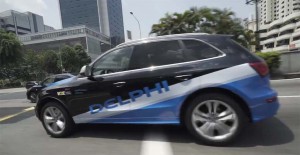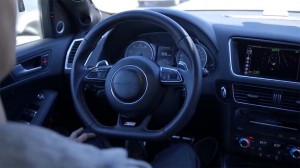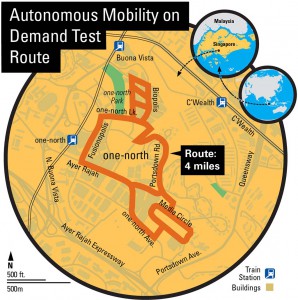Automotive mega-supplier Delphi is partnering up with the nation-state of Singapore to launch an ambitious autonomous vehicle test program meant to supplement the existing mass transit system.
The goal of the on-demand system is to make six battery-electric, self-driving cars available for rides on demand along three fixed routes to ferry people between their homes, offices and conventional mass transit stations. Backup “safety drivers” will remain behind the wheel initially, but by 2019 Delphi hopes to eliminate drivers – as well as back-up vehicles controls.
The project “allows us to demonstrate we have the complete ecosystem of knowledge and capability in the vehicle,” explained Glen DeVos, vice president of the service business unit at Delphi, the one-time General Motors partsmaking unit now based in the U.K.
Delphi is one of many carmakers and automotive suppliers exploring the opportunities for self-driving vehicle technology. The company isn’t planning to produce vehicles itself but hopes the Singapore project will convince carmakers to use both its hardware and software in autonomous vehicles of their own.
The project, which begins this week, will ultimately have battery cars running along a four-mile route near a business part in the southern end of the small island nation. The first car will be a specially outfitted Audi SQ5 but Delphi has yet to determine what the other vehicles will be. Also uncertain is how passengers will be charged. The project may sign users up for a fixed membership or charge on a per-ride basis.
(High-tech safety features score big with motorists, says new Power study. Click Here for more.)
“The focus will be on technical capability. Maybe about 2018 we’ll start to look at the commercial aspect and the cost of operation,” DeVos said. “We haven’t worked that out yet.”
Many analysts believe that autonomous vehicles will eventually change the way people are transported. One scenario would see a sharp reduction in the number of privately owned vehicles on the road as motorists opt, instead, for on-demand ride-sharing services like Uber and Lyft.
Indeed, Uber recently launched its own research center near Pittsburgh aimed at developing fully driverless vehicles that, the company’s CEO has suggested, will reduce costs to the point where ride-sharing would be cheaper than owning a vehicle.
According to DeVos, the project could take on other functions beyond substituting for conventional taxis and buses. Working with Singapore’s Land Transit Authority, it eventually may use autonomous vehicles to move goods and freight, perhaps even for services such as delivering dry cleaning.
Such an approach could have an appeal to high-tech retailers, such as China’s Alibaba and America’s Amazon. The latter has already announced plans to develop autonomous drones that could deliver a customer’s goods. Autonomous vehicles could substitute for larger purchases.
(Under fire, Mercedes pulls controversial self-driving TV ad. Click Here for the latest.)A number of other autonomous transport projects are under development, several of them in Europe. Google, meanwhile, has been adding a fleet of specially designed “Google Cars” near its headquarters in Silicon Valley, at a tech center in Austin, and other locations. It is also looking at adding driverless vehicles that would not even have a steering wheel or pedals for backup.
Many experts believe the first self-driving cars will reach production by early in the coming decade, though it remains to be seen how soon driverless models would follow.
A recent, fatal crash of a Tesla Model S running in semi-autonomous Autopilot mode has heightened concerns about the challenges of developing vehicles that could operate on their own under all circumstances.
(Tesla Model S was speeding at time of fatal Florida crash. Click Here for the latest developments.)



